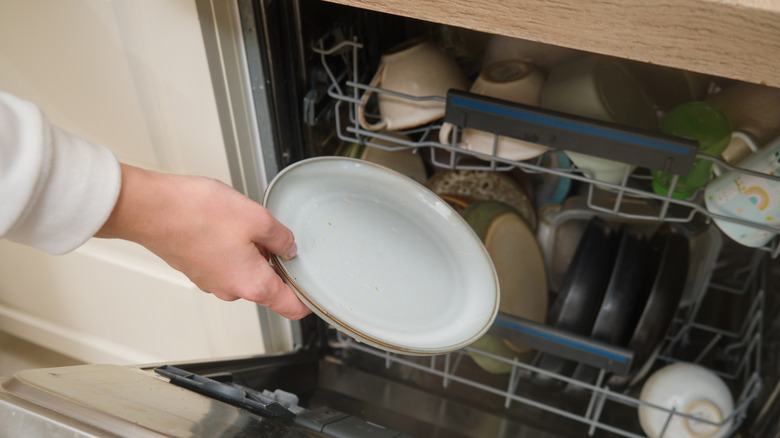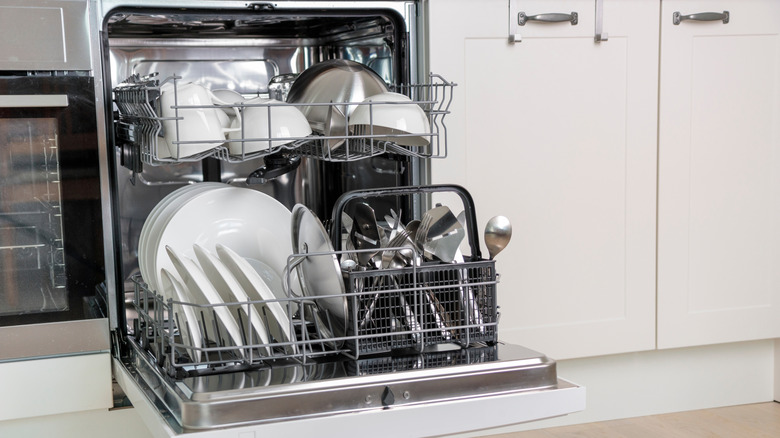Are More Expensive Dishwashers Better At Cleaning Dishes?
We may receive a commission on purchases made from links.
There are things in life you shouldn't skimp on, like toilet paper and bed sheets — but what about dishwashers? With the fancy bells and whistles today's machines come with, some are not exactly budget-friendly. However, in terms of pure cleaning power, cheaper models can generally get dishes just as clean as the high-end ones, especially when you follow tips for getting the most out of your dishwasher. While there is some truth to the adage that you get what you pay for, lower-priced dishwashers can even have some of the same premium features as their higher-priced counterparts. Affordable dishwashers can run $500 or less, and many come with features such as fingerprint-resistant finishes, energy-saving modes, and third racks.
When shopping for dishwashers, it can help to make a list of must-have features and start from the bottom of the price range. Regardless of your budget, it makes sense to ensure your new dishwasher is Energy Star certified. Energy Star dishwashers can help save money on your electricity bill, and depending on where you live, they can sometimes come with rebates.
Affordable dishwashers can still get the job done
It's not difficult to find an affordable dishwasher that works just as well as those expensive ones to get your dishes clean. Take Bosch's most expensive dishwasher, the Benchmark Series, which retails for around $1600. Since the Bosch 100 Series comes in at under $600, what are you paying for with the more expensive model? Both machines promise to remove "up to 99.9% of bacteria," according to Bosch. The Benchmark does come with a host of luxury features, like a third rack, advanced wash cycles, and premium drying capability — but that doesn't mean it will get your dishes cleaner.
The YouTube Channel FixDotCom posted a short in which they compared the cleaning power of four dishwashers ranging in price from $400 to $1,000. Although the three more expensive machines had more "advanced" spray arms and hardware, all four had equal results in removing pasta sauce from dishes. Although dishwashers may vary in terms of their longevity, this experiment indicates that, in general, a basic machine can do at least as good a job as more expensive ones. If all you need is a machine that reliably gets your dishes clean, an expensive dishwasher is an appliance splurge that may not be the best use of funds.
Why would you opt for an expensive dishwasher?
If you're willing to pay more for premium features, high-end dishwashers can make life a little easier. Luxury dishwashers often have more configurations and ways to customize the dishwashing experience, like smart technology that lets you schedule them to run at a certain time or specialized cleaning cycles for delicate dishes. Certain Bosch dishwashers are equipped with a feature that automatically opens the door at the end of a cycle, allowing fresh air to circulate. Also, high-end dishwashers can have larger capacities. The Fisher & Paykel Series 11 has a smart double "DishDrawer," which can tackle a 14-place setting with ease.
Perhaps the biggest perk of owning a high-end dishwasher is its relative noise level. Most standard dishwashers operate in the 46 to 60-decibel range, while more expensive ones can run at well under 45 decibels. A higher-priced dishwasher can be so quiet, you may have to check to make sure it's working. Some more expensive units have custom cycles that can handle a full load of dishes in less than an hour, and they can come in a range of eye-catching finishes and color options — the sleek GE Café dishwasher, for example, comes in a platinum glass finish with your choice of a bar or pocket-style handle. Luxury dishwashers can absolutely make dishes less of a chore and add a touch of class to your kitchen — just make sure to steer clear of these dishwasher brands to avoid.


